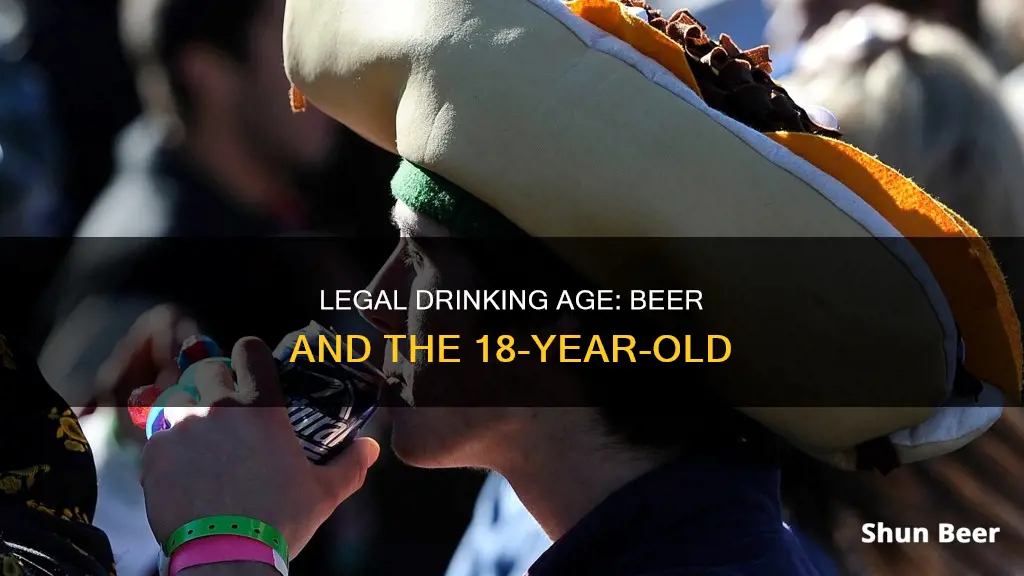
The legal drinking age varies across the world. In the United States, the legal drinking age is 21, while in Canada, it is 18 or 19 depending on the province. In Europe, the legal drinking age is typically 18, but there are exceptions where it is 16 or 17. These laws are in place to prevent underage drinking and reduce the associated health and safety risks, such as brain development issues and drunk driving accidents. While the legal drinking age is typically enforced for purchasing and public consumption, there are exceptions that allow minors to drink alcohol in certain situations, such as with parental consent or for religious purposes.
| Characteristics | Values |
|---|---|
| Legal drinking age in most countries | 18 |
| Legal drinking age in Canada | 18 in most provinces; 19 in Nova Scotia, British Columbia, and Northwest Territories; 17 in Alberta, Quebec, and Manitoba with parental supervision |
| Legal drinking age in the US | 21 |
| Legal drinking age in the US Virgin Islands | 18 |
| Legal drinking age in Puerto Rico | 18 |
| Legal drinking age in Europe | 18 |
| Legal drinking age in India | 18-25, varies by state |
| Legal drinking age in China | 18 |
What You'll Learn

Drinking laws in the United States
In the early 20th century, most states set the minimum drinking age at 21, as this was the voting age at the time. However, in the early 1970s, following the passage of the 26th Amendment, which lowered the voting age to 18, many states also lowered the drinking age to 18.
In 1984, President Ronald Reagan signed the National Minimum Drinking Age Act, which required states to raise their drinking age to 21 or lose 10% of their federal highway funding. By 1988, all 50 states had complied with this legislation. Today, the minimum legal drinking age in all U.S. states and most territories is 21.
While the purchase of alcohol by people under 21 is banned across the U.S., the legal details for consumption vary. Some states completely ban alcohol consumption for people under 18, while others permit it under certain circumstances, such as in the presence of a parent or guardian, for religious or medical purposes, or in a private residence.
The debate around the drinking age in the U.S. continues, with some arguing that the current law encourages binge drinking and that it would be better to introduce alcohol to minors in a controlled environment. Others maintain that the drinking age should remain at 21, citing concerns about alcohol-related injuries and deaths.
The Knockout Beer Bong: How Does It Work?
You may want to see also

Drinking laws in Canada
Canada's drinking laws are a legacy of Prohibition, a temperance movement that swept across the country and the US in the early 20th century. After Prohibition, responsibility for alcohol regulation was gradually devolved to the provinces, resulting in variations in laws from region to region. Each province established an agency to oversee the distribution, sale, and consumption of alcoholic beverages, such as wine, beer, and spirits.
The differences in drinking laws across Canada can be observed in the retail market for alcoholic beverages. For example, in Quebec, beer can be purchased in corner stores and grocery stores, whereas in Ontario, beer is only available at the Beer Store and the Liquor Control Board of Ontario. Alberta offers a private retailer market for alcohol, while British Columbia has some mixed markets, and other provinces like New Brunswick, Prince Edward Island, and Nova Scotia have government-only markets.
Another example of the varying drinking laws in Canada is the Importation of Intoxicating Liquors Act, a federal law from 1928 that prohibits the transportation of intoxicating liquor into any province from within or outside Canada without permission from the provincial liquor control board. This law has been a point of contention for those in the alcohol industry, who see it as an inconvenience and a hindrance to expanding their customer base.
Drinking Beer While Playing in UEFA Champions League
You may want to see also

Drinking laws in the United Kingdom
In the United Kingdom, the sale of alcohol is restricted and regulated by the Premises Licence and Personal Licence. The Premises Licence authorises the sale of alcohol by outlining the times and conditions under which it can be sold. The Personal Licence allows individuals to sell or authorise the sale of alcohol by others. A Designated Premises Supervisor (DPS) or Designated Premises Manager (DPM) must be named on every Premises Licence and hold a valid Personal Licence for alcohol to be sold at the licensed premises.
Age Restrictions
The minimum age at which people are legally allowed to purchase alcohol in the UK is 18. It is illegal for adults to buy or attempt to buy alcohol for those under 18. Under-18s can be stopped, fined, or arrested by the police for drinking alcohol in public.
Exceptions
In England, Scotland, and Wales, it is not illegal for someone between the ages of 5 and 17 to drink alcohol at home or on other private premises, although this is not recommended. If children do drink alcohol, it is advised to wait until at least the age of 15 and to do so with the guidance of a parent or carer in a supervised environment.
Sixteen and 17-year-olds, when accompanied by an adult, can drink (but not buy) beer, wine, or cider with a meal at a licensed premises, except in Northern Ireland. However, it is illegal for this age group to drink spirits in pubs, even with a meal.
Working in a Licensed Premise
Sixteen and 17-year-olds who work in a licensed bar, restaurant, or shop can serve alcohol as long as the licence holder or bar manager has approved the sale and it complies with any other restrictions set out in the licence.
Drinking Beer on Miramar Beach: What's Allowed?
You may want to see also

The effects of alcohol on the adolescent brain
The legal drinking age is the minimum age at which a person can legally consume alcoholic beverages. This age varies depending on the country. While the majority of countries have a minimum legal drinking age of 18, some countries set it at 19 or 20, and others at 21 or even 25. The main reason behind the law is the effect of alcohol on the adolescent brain.
The adolescent brain is still maturing, and alcohol can have a negative impact on memory and long-term thinking. Research shows that alcohol increases the chance of risky behaviour, especially in teens and young adults. It may also have severe, long-term effects on young, developing brains.
During adolescence, the brain undergoes significant changes, including the maturation of the GABA system, which is responsible for planning, organisation, short-term memory, cognitive control, and decision-making. Studies have shown that adolescents have lower levels of GABA in their frontal lobes than young adults, making them more susceptible to the effects of alcohol.
The prefrontal cortex, which controls judgment, decision-making, and impulse control, is not fully developed until the age of 25. This underdevelopment, combined with the effects of alcohol, increases the likelihood of adolescents engaging in risky behaviours, such as drunk driving, unsafe sex, and violent behaviour.
Another vulnerable area of the adolescent brain is the hippocampus, which is involved in memory and learning. Studies indicate that early drinking leads to poor performance on memory, attention, and spatial skills tests.
The impact of alcohol on the adolescent brain can be long-lasting and may interfere with teens' ability to perform in school and retain new information. Research suggests that drinking during this critical growth period can lead to lifelong damage to brain function, particularly in memory, motor skills, and coordination.
Additionally, the earlier a person starts drinking, the more likely they are to develop serious problems with alcohol or drug addiction later in life. This is why it is essential to educate teens and their caregivers about the effects of alcohol on the developing brain and the importance of delaying drinking until the brain has fully matured.
Beer and Methylprednisolone: Safe Mix?
You may want to see also

The legal consequences of underage drinking
The legal drinking age varies across the world. While most countries have a minimum legal drinking age of 18, some countries set this minimum limit at 19 or 20, and a few even have no drinking age restrictions. In the US, for instance, the legal drinking age is 21, and in India, it varies from state to state, ranging from 18 to 25.
Underage drinking can have serious consequences, and it is considered a criminal offense in many places. Here are some of the legal consequences of underage drinking:
Criminal Penalties
Underage drinking, purchasing, or possessing alcohol is typically classified as a misdemeanor criminal offense. For a first-time offense, the punishment may include fines, alcohol counseling, community service, and driver's license revocation. For example, in Lawrence, Kansas, a minor under 18 convicted of transporting an open container of alcohol can be fined up to $200, while a minor between 18 and 21 years old can be sentenced to jail for up to six months and fined up to $200 for the same offense.
Penalties for Underage DUI
Most jurisdictions have zero-tolerance laws for underage drinking and driving, with severe penalties. Even a small amount of alcohol in an underage person's system can result in a DUI charge. A drunk driving conviction can lead to fines, probation, community service, driver's license suspension, mandatory alcohol education, and even jail time.
Suspension of Driver's License
In addition to the criminal penalties, underage drinking can result in the suspension of one's driver's license. This can occur even if the minor is not driving but is simply in possession of alcohol or transporting an open container.
Difficulty in Finding Employment and College Admissions
An alcohol conviction on a minor's record can create long-term consequences, impacting their future opportunities. Colleges and employers may take alcohol convictions into consideration, making it more difficult for the individual to get accepted into their desired college or find a job.
Health and Safety Risks
Underage drinking can have detrimental effects on an adolescent's health and well-being. Alcohol can negatively impact memory and long-term thinking and cause liver failure and hormone imbalances in teens. Additionally, underage drinking increases the risk of accidents, suicide, and homicide, contributing to the declining life expectancy among young adults.
Legal Consequences for Adults Providing Alcohol to Minors
It is important to note that not only minors face legal consequences. Adults who purchase, give, or make alcohol available to minors can also be charged with violating the law. This includes friends or relatives over the legal drinking age who provide alcohol to minors.
Penalties for Using Fake IDs
Using a fake ID to purchase alcohol is illegal and can result in significant penalties. These penalties can include fines ranging from $250 to $2,500, community service, and even jail time, depending on the jurisdiction. Additionally, the use of a fake ID can result in a suspension of one's driver's license or delay in obtaining one.
Hoppy Beer and IBS: A Safe Pairing?
You may want to see also
Frequently asked questions
No, the legal age for purchasing or publicly consuming alcohol in the United States is 21.
It depends on the province. In Alberta, Quebec, and Manitoba, the drinking age is 18, while in other provinces, such as Nova Scotia and British Columbia, the drinking age is 19.
Yes, in some countries and states, there are exceptions that allow 18-year-olds to drink beer with parental consent or in private residences. These exceptions vary by location, so it's important to check the local laws.







